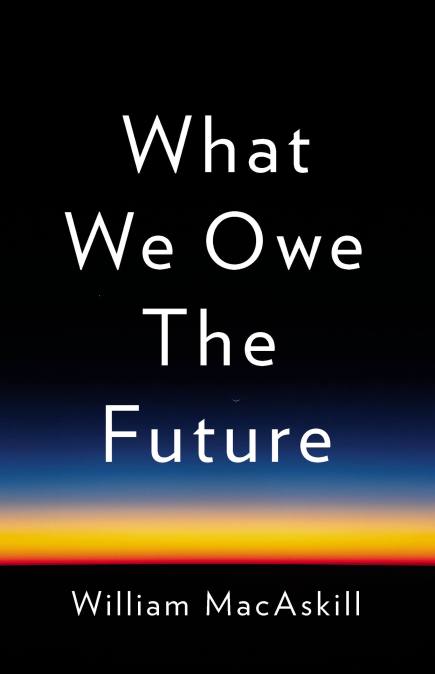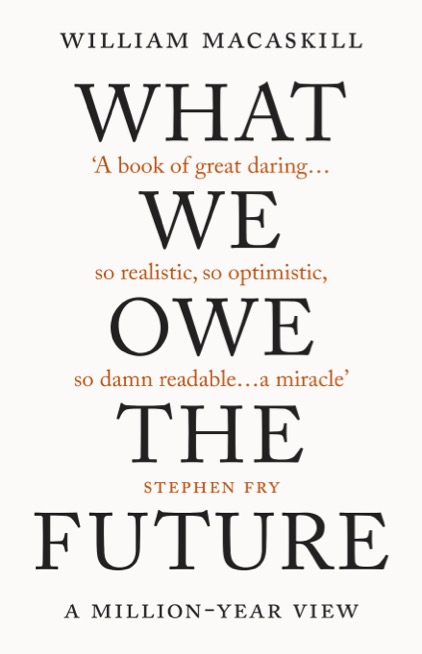Summary
- My new book on longtermism, What We Owe The Future, will come out this summer
- You can now pre-order a copy (US link, UK link)
- If you want to help with the book launch, I think pre-ordering is probably the highest-impact thing you can do right now
Longer Summary
I’ve written a book!!
It’s called What We Owe The Future. It makes the case for longtermism — the view that positively affecting the long-run future is a key moral priority of our time — and explores what follows from that view. As well as the familiar topics of AI and extinction risk, it also discusses value lock-in, civilisational collapse and recovery, technological stagnation, population ethics, and the expected value of the future. I see it as a sequel to Doing Good Better, and a complement to The Precipice.
I think I’ve probably worked harder on this project than on any other in my life, and I’m excited that the launch date is finally now in sight: Aug 16th in the US and Sep 1st in the UK. I’m looking forward to being able to share it and discuss it with you all!
I’m now focused on trying to make the book launch go well. I’d really like to use the launch as a springboard for wider promotion of longtermism, trying to get journalists and other influencers talking about the idea. In order to achieve that, a huge win would be to hit The New York Times Bestseller list. And in order to achieve that, getting as many pre-orders as possible is crucial.
In particular, there’s a risk that the book is perceived by booksellers (like Amazon and Barnes and Noble) as being “just another philosophy book”, which means they buy very few copies to sell to consumers. This means that the booksellers don’t put any effort into promoting the book, and they can even literally run out of copies (as happened with Superintelligence after the Elon tweet). Preorders are the clearest way for us to demonstrate that WWOTF (or, as I prefer, “WTF?”) is in a different reference class.
For these reasons, I think that pre-ordering WWOTF is probably the highest value thing you can do to help with the book launch right now. The US link to pre-order is here, the UK link is here, and for all other countries you can use your country’s Amazon link.


About the book
My hope for WWOTF is that it will be like an Animal Liberation for future generations: impacting broadly how society thinks about the interests of future people, and inspiring people to take action to safeguard the long term. If the launch goes well, then significantly more people — including people who are deciding which careers to pursue, philanthropists, and political decision-makers and policy-makers — will be exposed to the core ideas.
The book is aimed to be both readable for a general audience and informative for EA researchers or interested academics. (Though I’m not sure if I’ve succeeded at this!) So there’s a wide breadth of content: everything from stories of historical instances of long-run impact to discussion of impossibility theorems in population ethics. And, following Toby Ord’s lead, there is an ungodly number of endnotes.
The table of contents can give you the gist:
- Introduction
- Part I. The Long View
- Chapter 1: The Case for Longtermism
- Chapter 2: You Can Shape the Course of History
- Part II. Trajectory Changes
- Chapter 3: Moral Change
- Chapter 4: Value Lock-In
- Part III. Safeguarding Civilization
- Chapter 5: Extinction
- Chapter 6: Collapse
- Chapter 7: Stagnation
- Part IV. Assessing the End of the World
- Chapter 8: Is It Good to Make Happy People?
- Chapter 9: Will the Future Be Good or Bad?
- Part V. Taking Action
- Chapter 10: What to Do
In the course of writing the book, I’ve also changed my mind on a number of issues. I hope to share my updates before launch.
Why early pre-orders are important
If you plan on ordering the book at some point, I’d greatly appreciate it if you could order it now.
Early pre-orders have many advantages in the world of publishing which will lead to greater promotion of the book once it’s released in August:
- Pre-orders count as first week sales in the eyes of the New York Times Bestseller list, so if we drive a lot of pre-orders now, What We Owe The Future will be much more likely to hit the bestseller list in the first week.
- This matters because (a) many people look to bestseller lists to guide which books they buy, and (b) being on the list also leads to more press opportunities. It’s hard to know the exact effect of this, but one 2004 study found that appearing on the New York Times Best-Seller list increased first-time authors’ sales by 57 percent, and on average, for a book’s first year on shelves, it increased sales by 13 or 14 percent.
- Early pre-orders also signal to major booksellers that the book is popular, which leads them (a) to order more of the book and (b) market the book more prominently on their websites and in their bookstores.
- This means booksellers are more likely to partner with us for discounts and promotions, since they will have a lot of the book in stock that they’ll want to sell.
- Lastly, when booksellers buy more of the book, it makes it less likely that they will run out of stock, as happened with Superintelligence, and sapped some of the momentum for sales.
I’m also excited to talk with potential readers, so as a thank-you for your support and interest, I’ll arrange to have Zoom chats about the book with eight randomly-chosen people who’ve preordered. If you’re interested in that, then submit a screenshot of your receipt to the form included here; we’ll send out invites on May 1st.
FAQs
Should I share the book on social media?
- If you have a decently-sized EA social media following that you think would be interested in ordering the book several months before its launch, I’d love for you to share the pre-order link!
- Instead of sharing this post, which is targeted primarily at engaged EAs, please share the US publisher’s page link or the Amazon page. Here’s an example of a really nice Tweet :)
- If your social media following is primarily non-EAs and you’d prefer to only post about the book once, you should probably hold off on posting until nearer to the book launch. Most authors do not attempt to drive pre-orders this early in their campaign due to a lower conversion rate — people typically don’t buy books so early in advance.
I want to purchase 20 or more copies of What We Owe The Future. What should I do?
- Contact abie@forethought.org to help arrange this.
I’m a group organiser. Should I tell my university/local group to purchase the book?
- If you think your group might be interested in purchasing the book, I’d be thrilled for you to share.
- Also note that you can order other EA books for your university group via EA Books Direct
- If you are interested in doing a centralised order of 20 or more books for the fall semester, please contact abie@forethought.org.
Should I purchase the hardcover or the Kindle version?
- Purchasing the hardcover version is more advantageous for reaching the bestsellers list and convincing booksellers to order more of the book. But of course this is up to your reading preferences!
If you have any other questions about promotion for the book, you can email Abie at abie@forethought.org.




Yes, it will once launched! (Will is doing the audiobook)